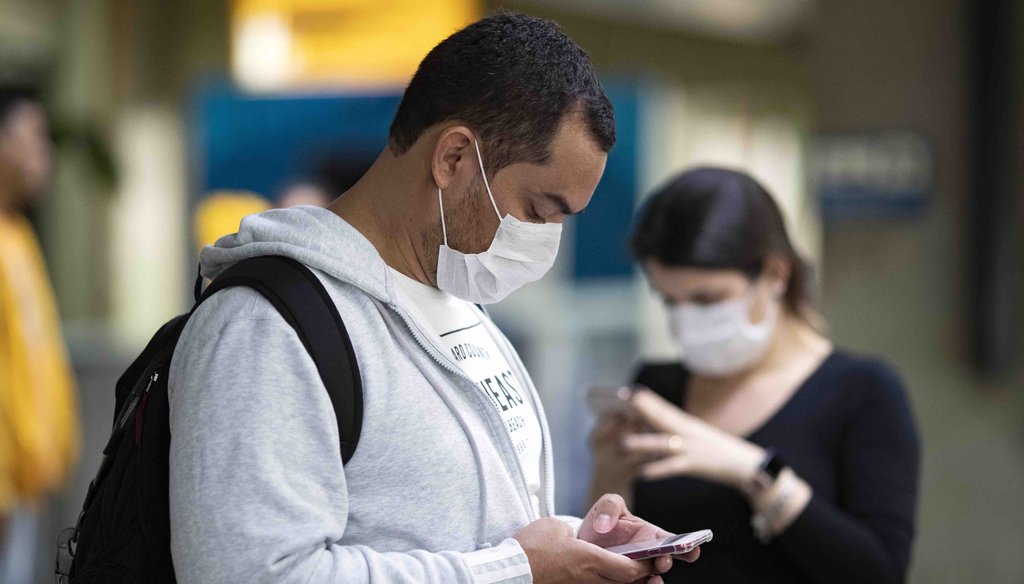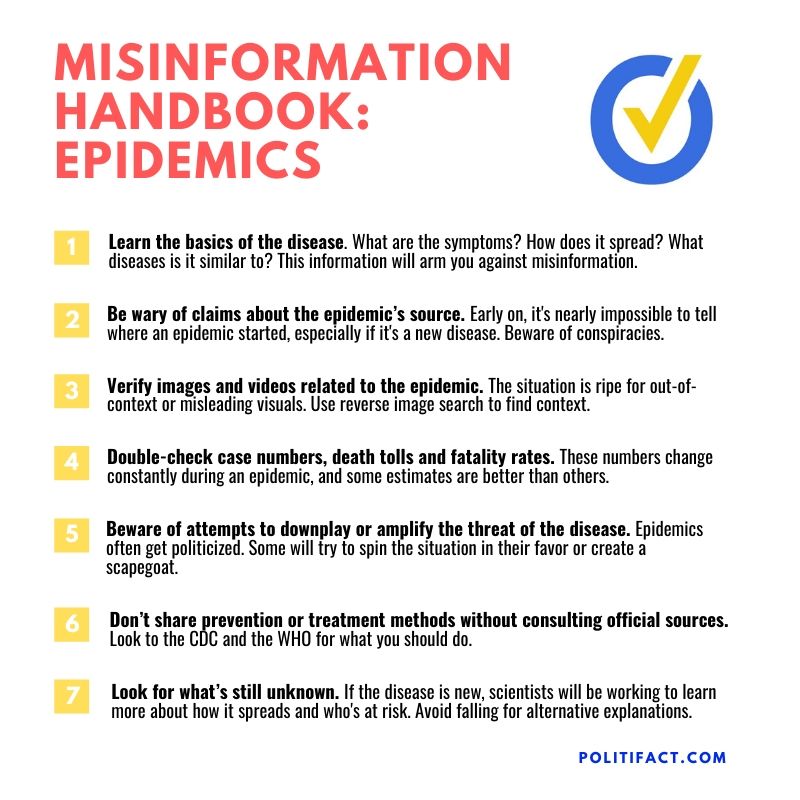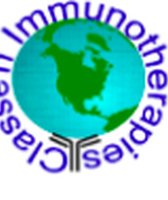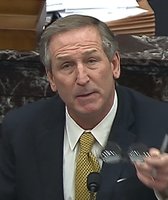Stand up for the facts!
Our only agenda is to publish the truth so you can be an informed participant in democracy.
We need your help.
I would like to contribute

Passengers wearing masks as a precaution against the spread of the new coronavirus COVID-19 use their phones at the Sao Paulo International Airport in Sao Paulo, Brazil, on Feb. 27, 2020. (AP)
PolitiFact has fact-checked a lot of popular social media posts about the 2019 coronavirus, COVID-19.
We’ve debunked fake coronavirus cures, false news reports and conspiracy theories about the spread, as well as out-of-context images, bogus maps and even a fabricated reference from "The Simpsons."
PolitiFact will keep fact-checking these hoaxes as they surface — but we want our readers to be prepared, too.
So we’ve created a guide with seven ways to avoid falling for some of the most common falsehoods about epidemics like the coronavirus. Have a tip you want us to add or a post you want us to fact-check? Email [email protected].
Download the image below to share an abbreviated version of this guide on social media.
1. Learn the basics of the disease
What are the symptoms? How does it spread? What diseases is it similar to? The more basic information you have about the disease, the better prepared you’ll be to spot online misinformation. Just know it might be scant early on. Look to the Centers for Disease Control and Prevention and the World Health Organization for guidance.
2. Ignore posts that say the disease is planned
In the early stages, it can be difficult to tell where an epidemic started, especially if it's a new disease. That’s where conspiracy theories come in. With the coronavirus, some have asserted the disease is a bioweapon, was created in a lab or was planned by someone in power to make money. Resist the urge to share these baseless claims.
3. Verify images and videos
Ongoing epidemics are ripe for out-of-context or misleading visuals. Be skeptical of images or videos that claim to show people affected by the disease or the government’s response to it. When in doubt, use tools like Google Reverse Image Search, RevEye and InVid to find the original context of images or videos you see on social media. (If you can upload a photo to Facebook, you can use these tools.)
RELATED: 10 tips for verifying viral social media videos
4. Double-check case numbers, death tolls and fatality rates
These are the numbers that officials use to measure the severity of epidemics — and they change day to day. That environment makes it easy to take outdated information out of context, or worse, fabricate numbers. For a verified count of those affected by the disease, look to the WHO’s situation reports. (Here are some examples for the 2019 coronavirus.)
5. Beware of attempts to downplay or inflate the threat of the disease
Epidemics often get politicized, and some people will use spin to deflect blame or create a scapegoat. Watch out for claims that attempt to pin the outbreak on one politician, party or group of people, such as President Donald Trump wrongly blaming Barack Obama for limits on coronavirus testing. Epidemics can have any number of causes, and assigning blame is never as simple as partisans would have you believe.
6. Don’t share prevention or treatment methods without consulting official sources
As an epidemic spreads around the world, so too do social media posts prescribing tactics for preventing and treating infection. Some hoaxes like drinking bleach to cure coronavirus may be dangerous, while others may be harmless, but the end result is the same: misinformation. For confirmed ways to protect yourself, look for guidance from the CDC, WHO and local public health authorities.
7. Look for what’s still unknown
It’s an uncomfortable truth, but there is often a lot that scientists don’t know. Details like how the disease spreads, at what point it’s contagious and how deadly it is can take weeks or months to figure out. (The death rate for COVID-19 is a good example of something that is likely to change but we can’t say for certain.) In the meantime, bad or made-up information proliferates online. To avoid it, stick to what’s known about the epidemic — and look for trustworthy sources that are upfront about what they don’t know as well.
Our Sources
The New York Times, "How Deadly Is Coronavirus? What We Know and What We Don’t," March 7, 2020
PolitiFact, "A reader’s guide to misinformation about the coronavirus," Jan. 31, 2020
PolitiFact, "Blog falsely claims Pope Francis tested positive in a second coronavirus test," March 5, 2020
PolitiFact, "Bloggers: Bill and Melinda Gates, George Soros funded Sierra Leone lab that started Ebola outbreak," Aug. 11, 2014
PolitiFact, "China air quality projections used to promote coronavirus cremation hoax," Feb. 26, 2020
PolitiFact, "Claim that 10,000 have died from Wuhan coronavirus is Pants on Fire," Jan. 28, 2020
PolitiFact, "D’oh, ‘The Simpsons’ didn’t predict the coronavirus," Feb. 27, 2020
PolitiFact, "Fact-checking hoaxes and conspiracies about the coronavirus," Jan. 24, 2020
PolitiFact, "Far-right radio host Hal Turner promotes unproven coronavirus bioweapon conspiracy," Feb. 11, 2020
PolitiFact, "Health misinformation site promotes conspiracy about coronavirus," Feb. 10, 2020
PolitiFact, "Nine people have died from the coronavirus in the United States," March 3, 2020
PolitiFact, "No, drinking bleach will not ward off coronavirus," Jan. 30, 2020
PolitiFact, "No, vitamin C cannot slow or stop the spread of the coronavirus," Feb. 29, 2020
PolitiFact, "Rep. Phil Gingrey says migrants may be bringing Ebola virus through the U.S.-Mexico border," July 18, 2014
PolitiFact, "Romanian conspiracy theory migrates to US amid coronavirus outbreak," March 6, 2020
PolitiFact, "Stop sharing myths about preventing the coronavirus. Here are 4 real ways to protect yourself," March 5, 2020
PolitiFact, "These plushies do not ‘commemorate’ the 2019 Novel coronavirus strain," Feb. 3, 2020
PolitiFact, "Trump wrongly blames Obama for limits on coronavirus testing," March 6, 2020
World Health Organization, Coronavirus disease (COVID-2019) situation reports, accessed March 10, 2020



































